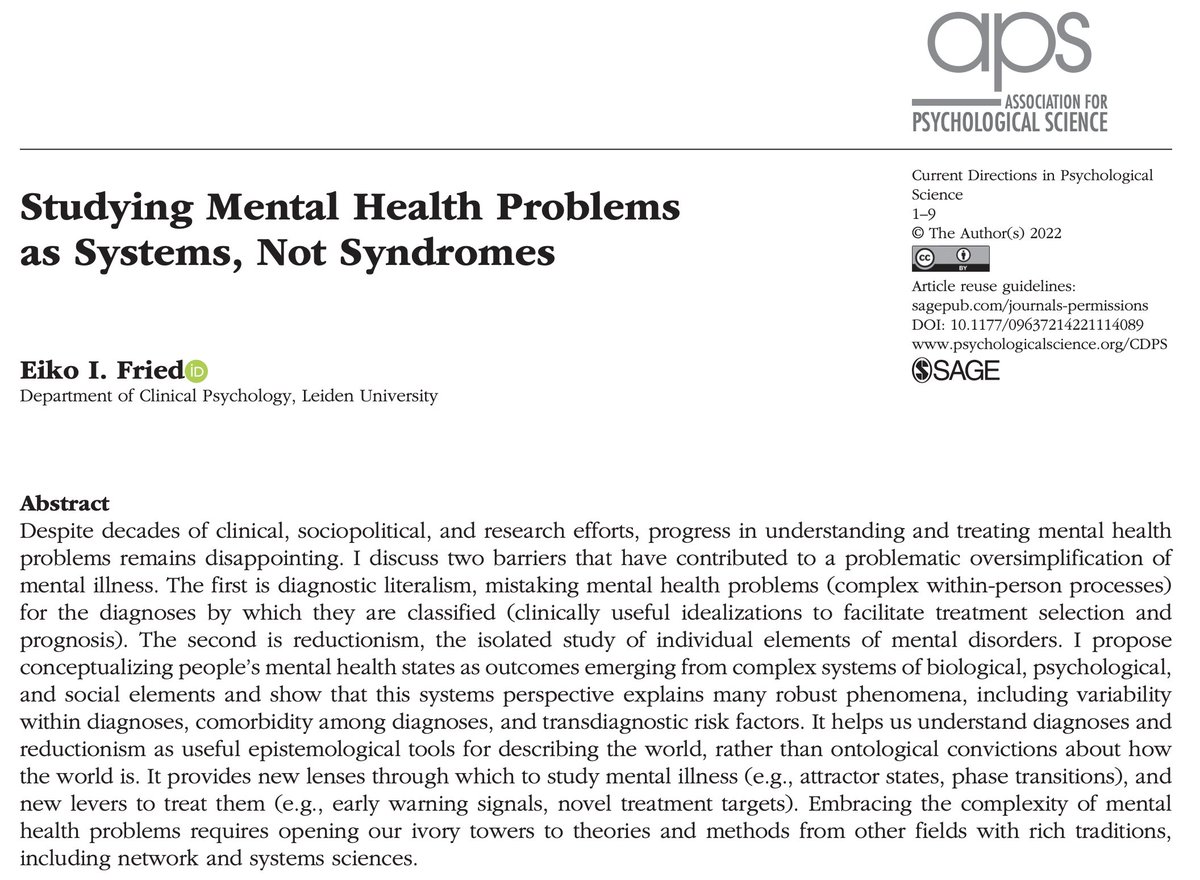
Associate Prof @UniLeiden. Mental health & data science (https://t.co/NHlcPRzyYW). Building an early warning system for depression (https://t.co/xKqSGrvQnU).
2 subscribers
How to get URL link on X (Twitter) App

https://twitter.com/lucyfarnik/status/1822391308356325649Here a recent @scifri episode on the numerous problems of the Lykos/MAPS studies specifically from the perspective of 1) lived experience, 2) psychotherapy, and 3) clinical trial design.



https://twitter.com/fdaadcomms/status/1798104612635070611📄Many mentioned reasons overlap with those we summarized recently in our review paper:


 2/8 EMA data collection is increasing exponentially, but there are many challenges:
2/8 EMA data collection is increasing exponentially, but there are many challenges:
 We start by clearly differentiating the theoretical p-factor (from here on: P, thought to describe and perhaps cause variation in all forms of psychopathology) from the statistical 'general factor of psychopathology' (from here on: GFP, usually derived via latent variable models)
We start by clearly differentiating the theoretical p-factor (from here on: P, thought to describe and perhaps cause variation in all forms of psychopathology) from the statistical 'general factor of psychopathology' (from here on: GFP, usually derived via latent variable models)

 2/8 A discussion paper providing numerous perspectives on mental health classification — based on a super interesting panel discussion with lots of different perspectives at a conference!
2/8 A discussion paper providing numerous perspectives on mental health classification — based on a super interesting panel discussion with lots of different perspectives at a conference! 

 2/ Our editorial introduces the topic of fine-grained clinical elements and proposes pluralistic, multimethod, & multisystem approaches as way forward. It also features results of a survey in which we asked the author teams about their perspectives.
2/ Our editorial introduces the topic of fine-grained clinical elements and proposes pluralistic, multimethod, & multisystem approaches as way forward. It also features results of a survey in which we asked the author teams about their perspectives.
 2/ There is massive hype around psychedelics as treatment for MH problems, w many positive findings in the lit. This goes together w increase in pubs, pharma investments, patents, & shifts in political/legislative landscapes. In US alone, ≥500 ketamine clinics have emerged.
2/ There is massive hype around psychedelics as treatment for MH problems, w many positive findings in the lit. This goes together w increase in pubs, pharma investments, patents, & shifts in political/legislative landscapes. In US alone, ≥500 ketamine clinics have emerged.




 This is a practice to save time, but begs the question: are there people with many so-called "secondary" depression symptoms who do not have the core symptoms? This is what our new paper in JPCS led by the wonderful @orla_mcbride is about.
This is a practice to save time, but begs the question: are there people with many so-called "secondary" depression symptoms who do not have the core symptoms? This is what our new paper in JPCS led by the wonderful @orla_mcbride is about.
https://twitter.com/NilsRWinter/status/16334581916433121282/4 I'm not surprised by the results: depression is not a unitary, biological disease entity. It is a label that was historically developed for clinical utility: it is a heuristic superimposed on a complex landscape of mental health problems people experience.


 Highly recommended if you always wanted to know what colliders are or do—and if you ever "added x and y as covariates" to e.g. a linear regression because that is "what your field does".
Highly recommended if you always wanted to know what colliders are or do—and if you ever "added x and y as covariates" to e.g. a linear regression because that is "what your field does".

https://twitter.com/VFlaudias/status/15942717075225313312/ This is in my part my 'fault' bc I kept submitting it to applied journals, but I really didn't want this paper in a "journal specialized on measurement" (quote from 6 rejection letters): I wanted to reach clinicians & applied researchers.


 2/ The other Prof we "lost" 3 yrs ago had committed fraud, tampered w data & grant applications, taken blood samples w/o ethics approval, fabricated experiments, removed participants, dropped & added authors (and was then hired by TU Dresden for .. I don't know exactly for what).
2/ The other Prof we "lost" 3 yrs ago had committed fraud, tampered w data & grant applications, taken blood samples w/o ethics approval, fabricated experiments, removed participants, dropped & added authors (and was then hired by TU Dresden for .. I don't know exactly for what).
https://twitter.com/EikoFried/status/1583016873137881088(in our case, the zero correlation was due to a Qualtrics export error that was language specific—it was present in only half the sample, and not in the other, leading to group-level data that looked fine overall and behaved appropriately, but didn't correlate w other measures)

 In the paper, I describe 2 barriers to progress that our field has not sufficiently grappled with.
In the paper, I describe 2 barriers to progress that our field has not sufficiently grappled with.
 And I guess technically this should also count 😇
And I guess technically this should also count 😇